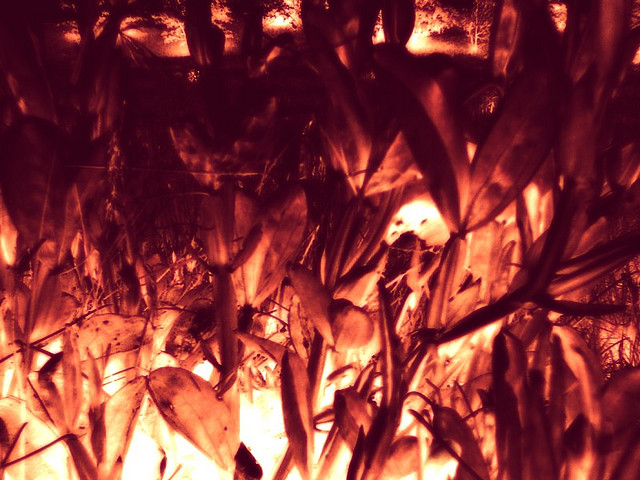‘The signs were like a collective raft, keeping them afloat as they waited on responses to their calls of distress.’

June 3, 2016
With unblinking eyes, Young Mun’s father, Cha Jin Goo, watched the man before the television camera staring back with an intensity of recognition as though it were a machine trapping his missing older sister. The man shook the sign in his hands to amplify his message in a last gamble to be seen. Then the man curled into a stone and pressed his forehead to the floor with his sign held above him. Nuna, nuna, come home.
Young Mun caught his father weeping at the screen. He wanted to turn it off for both their sakes.
There had been no commercial interruptions since the public demanded that the telethon continue, and so for twelve hours at a stretch, an endless stream of families lined up for their fifteen seconds in front of the camera. They carried placards that named missing family members and lovers, lost since the Korean War.
Although Jin Goo barely left home as it was, Young could do nothing now to get him to leave his seat. When he returned from the restaurant with the meals he cooked at the end of his shift, Young would find his father watching the telethon amid the ringing phones and pleas, just as he had left him.
The crew at KBS rushed over to escort the man offstage so the next participant could go on. They tapped him on the back, bending over to whisper that it was time. They lifted him by the armpits and his shoes squeaked against the floor when he went limp. It would have been too shameful to carry him.
Young Mun watched as Jin Goo slumped over in his chair, his mouth slightly open, his bottom lip protruding, as if he were on the verge of saying something. Young thought that perhaps his father was reading the placards that the searchers held in front of their chests, listing their own names, those of missing kin, and how they were separated. Young wanted to grab his father by his shoulders and shake him out of his dream, or use his hands to straighten his father into the man he used to be.
Young knew that his father was looking for his wife, Cha Min Ah. His father had never let Young forget her name.
“Father, do you want to eat now?” Young said. He waited for a response. “What do you want to do?”
They were planning to leave Korea before the telethon began. Young had worked at the restaurant since high school and, because of his long hours, could never afford to attend tutoring or make the necessary test scores to even consider the university. No use in studying astronomy, his father would say. What is so important that could be out there?
But Young had his sights set elsewhere: if not the sky, then somewhere far across Korea. His coworkers were always mentioning people who had moved to Hawai’i, Los Angeles, even New York, to start new lives—one that didn’t carry the bleakness of familiarity.
Young believed that it would be better for his father to move. Otherwise, his father waited with a stubborn passivity, allowing the seismic nature of fate to account for his days. It was almost an act of preservation, Young thought, and he had unwittingly complied by listening to his stories. The stories that accounted for each day of his life leading up until the very moment when he realized he would never see his wife or brother again. But it had become increasingly difficult for Young to hear about these memories that needed constant polishing, these precise episodes of longing for a former life. This man is the embodiment of han, Young thought. This past life that kept his father forever paused, dismissed from the world.
Young’s plan was to move to Hawai’i to start a diner, or at least become his own boss. But since the telethon could no longer run daily, KBS moved the program to once a week every Friday. Not wanting to miss an episode, Jin Goo watched on this new schedule and refused to move.
“We must think about leaving here,” Young had urged. “For a better life.”
Jin Goo didn’t turn to address Young and continued staring at the television. “And what could be better about it? I don’t think you know.”
“Father, different is better. And that’s what you need the most. You barely leave home. You don’t try to make friends. And now you’re stuck watching this show and it seems like it’s the only thing you live for now. I’ve never seen you so committed to doing anything.”
“I’ve been your father. Have you not seen that?”
Young scoffed. “I need something different. Must I pay you back for doing your job as a father? Don’t I have to take care of you?” Young regretted raising his voice when he saw his father wince. “You’ve tried everything to find them. You have followed the news. You have appealed to the Red Cross. Now this show. You must move on. You’re not the only one who has lived with an absence.”
“Yes,” he said, more like a exhale than an enunciation.
“Have you ever considered that maybe it won’t happen in your lifetime?”
“Yes.” Then Jin Goo stood up and walked to Young, placing his hands on his shoulders. “You’re my only son.”
Jin Goo nodded to emphasize that he understood. His heart gave in for a moment; his father’s brown eyes belonged to a child.
“I am sorry. I just want to go there,” Jin Goo said, squeezing Young’s arms. “Jeong.”
The word, a bell. Young’s father had mentioned jeong before. A feeling not quite han but very similar: It existed both inside and outside of the heart, belonging to an object, location, household, or a face among many—a commitment without reason. It was the vibration crawling across a distance of rope between two people, a complex nervous system of thread.
“That is all that matters to me. Let me feel this one last time.”
Young couldn’t face his father. “How do you know this won’t be a waste of time?”
“What more is there to waste?” Jin Goo’s voice lowered. “I don’t care.”
Young moved to his father’s side and guided him back to the chair, fingertips on his spine. “Then this is it. If nothing happens after you go on, then we leave for good.”
“Then we can go.”
“What’s going on here?” Young asked the Red Cross volunteer as he waited for Jin Goo to fill out the paperwork at the booth. Many people weren’t waiting to enter the station at all and sat on the ground in rows, holding their signs in front of them as some united front—a wall all their own.
“There isn’t enough time for each of them,” she said.
“So they just stick around after they go on TV?”
“They come back, they stay.”
For those who left, she told him, their signs remained taped onto vans, cars, benches, and the walls of the studio. None of them were on the verge of falling off. Whoever put them up made sure they would stick, lining each side and corner, some even framed entirely with a border of tape. Young was surprised by how far up some of the signs were posted, high but not too out of sight. The site was becoming a monument to the lost, she said.
When there wasn’t enough room to post on the walls, searches taped their signs to their own bodies. Young saw one woman, much older than his father, carefully writing her names with permanent marker. She performed a balancing act between hand and instrument. She wiped at her cheeks quickly so her tears would not fall and blot her words. She pressed with such force against her sheet of paper that the marker made a shrieking noise as she traced the lines.
Young and Jin Goo crossed a path covered in signs. They stopped when they weren’t sure how to proceed. The signs were like a collective raft, keeping them afloat as they waited on responses to their calls of distress. They tried to avoid stepping on the signs, afraid of tearing them or leaving their footprints behind. Already there had been tracks of shoes and masks of dirt discoloring the white. The names would fade with enough time. Tape would give in to the wind. Young wondered just how many of these signs would cover this country—all this paper, all this bandaging.
A man searched the ground, holding his lower back as he craned forward and read, shuffling down the rows, occasionally falling on his knees, getting back up. He moved quickly among the edges of concrete while he scanned around his feet. It was difficult for Young to watch, the man possessed by some futile resolve that this would be the one. When he straightened up to stretch, there was a pained expression on his face followed by one of slight relief, a knowing that there were more to go, more opportunities to find something worth his search.
“Why aren’t you searching, like him?” Young indicated toward the man.
“They’re not here,” Jin Goo said. “I’ve watched enough of the show to realize this.”
Long before the telethon, Jin Goo had determined that his wife and older brother were killed during the war, or taken north during the manic shuffle between soldiers and civilians; otherwise he would have found them by now. He had berated himself: Why hadn’t he accompanied his wife to the ration station all those years ago? One of them had to stay behind, and his brother would go with her.
“They went so we could feed you.”
Young sat down by his father’s knees to watch after they had agreed to go on television. When relatives were found after they had called in to the station’s central phone number, they traveled to their nearest affiliate KBS station to speak by phone and a two-way transmission. The screen would split in half and both sides would talk to each other on air, initially confounded or unsure of whom they were looking at. One mother confirmed the identity of her son by a scar she knew that he had on his ankle, and the camera zoomed to reveal this same scar. There was another story of a man enlisting in the army and leaving a wife and child behind at a refuge center, only to come back unable to find them. There was a sibling who could not answer any questions her supposed brother was posing until she remembered that their home in North Korea was located behind two tall trees and a well. Many people were seeking those already in the south that couldn’t be found. Rarely did someone seek a loved one in the north, let alone a lost spouse. Young watched his father grip and release the armrests to circulate blood through his hands.
Even with a decade of negotiation between both Red Cross delegations, there was no agreement on how to implement a family search project. Even after the assassination of South Korea’s first lady Yuk Young-soo, and an invasion tunnel discovered underneath the DMZ, Jin Goo still believed in the possibility of exchange. It had always been difficult for Young to listen to his father’s excitement. He was starved for updates. Knowing there could be another newspaper or broadcast on reunification gave him reason to sleep and wake a day closer to finding his loss. Just a year ago, the Red Cross negotiated an exchange of a number of people, north and south carefully selecting their candidates. Unfortunately, Jin Goo had no chance of being accepted.
Maybe this time, Young thought.
Let him have this telethon. Let us.
After his father went up to raise his sign to the cameras, Young rushed on screen with his own handwritten sign. Even Jin Goo was shocked as Young jostled for space behind the queue. Instead of wife or brother, Young had written mother and uncle on his placard. He wrote that he could not remember her face. All he had was her name.
A studio worker with a headset and clipboard, perhaps with a list of all the people scheduled to go that day, called on Young to get closer. The hosts seemed surprised as they mentioned that they’ve mostly had older people on the show. He introduced himself as the son of the man who went before, born toward the close of the war.
Young wasn’t sure what to say next. He bit the inside of his lip, and he squinted under the lights hanging from the ceiling, obscuring the faces of the studio audience before him, past the end of the stage. The hosts asked him if there was something he wished to say.
Young closed his eyes. He talked about how sometimes certain smells made him think about how he once knew her. Trying to think about what she looked like to him when he was a child, it was like searching through black clouds for an outline, for a voice that flashed like sun on water. The lump in his throat jumped as he spoke, so he swallowed saliva to calm it down. Sometimes her voice sounded like it was coming from underwater, or maybe he was the one that was submerged and it was coming from above.
Looking straight at the camera lens, Young imagined that it was a compact version of the night sky. The red light behind the camera lens was a planet, deserted and dusty, Mars on fire. She could be there.
But his time was running out. Young would have to carry his father on his back, like he always had. The red light blinked, on, off, on, off. If only he could run right through that darkness and pierce through it to the other side. But Young knew that, no matter what, the closer you get to the speed of light, the more you weigh. His voice could make things clear, if only for an instant.
For more information about the show “Finding Dispersed Families,” click here.



